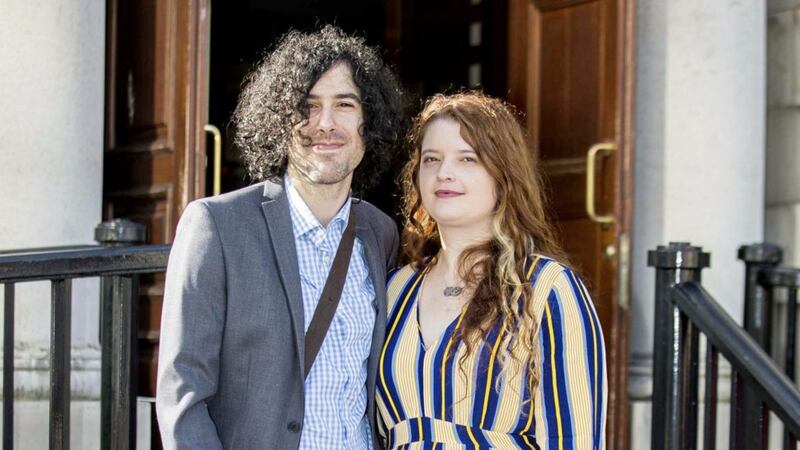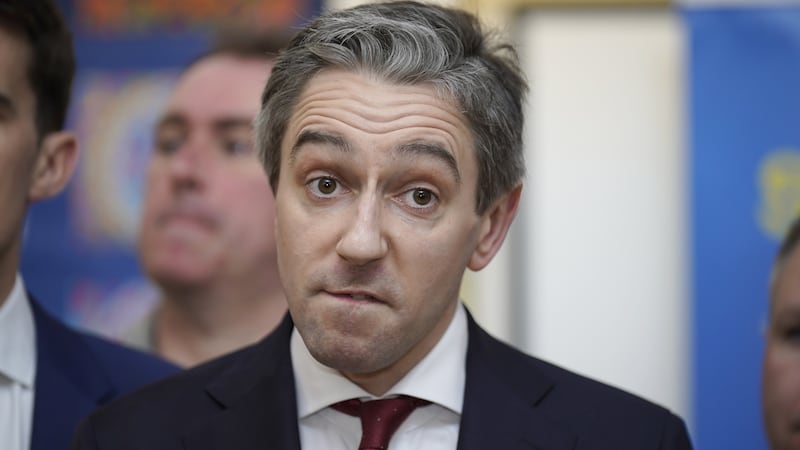It takes a lot of £20 donations to clear £40,000 of a debt of £45,000.
And in these Covid-straitened times it takes a lot of support and admiration for such donations to come, as they did, from all parts of Ireland including TDs and Seanadoirí in the Oireachtas and the European parliament.
But then again it is entirely understandable why such a flood of sympathy and donations would be spontaneously generated to help Emma and Jake De Souza reach their target in the incredibly short period of three weeks.
Emma and Jake captured the imagination of people all over Ireland when they took a stance to protect the Good Friday Agreement (GFA), Emma’s right to be accepted as Irish in the land of her birth and the consequential residency right for her husband Jake to live in Ireland with her.
The joy of married life, five years ago, took a sharp, unforeseen and unwanted turn for the newlyweds when Jake was refused a residency visa under EU regulations based on the legitimate claim by Emma that she was Irish and therefore entitled to claim residency for Jake per the citizenship clause of the GFA. It is a unique and special clause which accepts that people of the north can choose to be designated Irish, British or both.
The British Home Office not only rejected the residency application for Jake they attempted to deny Emma her Irish citizenship and impose British citizenship on her because she was born in an Irish village in south Derry.
Emma and Jake then entered into an unknown, stressful world of campaigning for the right to be recognised as Irish and the right to live in Ireland.
It was a ‘David v Goliath’ struggle with the all-powerful British Home Office implacably out to oppose Emma and Jake.
For five years their lives were placed on hold while Emma campaigned relentlessly. Money was scarce and became more so when the couple had to personally fund the campaign, including paying legal fees.
Emma estimated that £30,000 was raised during the five-year campaign. A campaign which notched up a major victory for the couple when the British government accepted that Irish citizens born in the north will be treated as EU citizens, for immigration purposes, an explicit recognition of Emma’s Irish citizenship.
And just as the couple were about to leave the upheaval of a campaigning life behind them, with a smile on their faces due to the landmark breakthrough and rediscover the joy of married life, they were presented with a legal bill for £45,000.
Now this bill has been dramatically reduced to £5,000 due to people’s generosity – a sum, nevertheless, still beyond Emma and Jake’s resources.
However, they are hopeful future donations will reduce the bill further.
Emma and Jake are overwhelmed by the popular response and the support in particular from Seanadóir Niall Ó Donnghaile (I work with Niall), Neal Richmond TD and Billy Kelleher MEP. They have urged the Irish government to pay Emma’s legal costs.
Emma and Jake’s case is a classic example of the need for constant vigilance when dealing with the British government.
We can see this starkly in the decision by the north’s Public Prosecution Service (PPS) which decided not to bring charges against British soldiers, except one, for the massacre on Bloody Sunday in Derry in 1972.
The claim that ‘available evidence is insufficient to provide a reasonable prospect of conviction’, is an affront to the dead and their families, and all the more so, because it is presented by an agency of the state whose purpose is to protect society from wrongdoing and injustice.
What about the ‘available evidence’ in abundance of the dead and wounded on the streets of Derry; the voluminous inquiry by Lord Saville which found those shot were innocent; the minute-by-minute television and pictorial account of the massacre as it took place?
Why should the PPS decide what is ‘insufficient’ and not a jury?
Despite the considerable progress made in the north it still remains an unjust society when dealing with matters related to the conflict.








